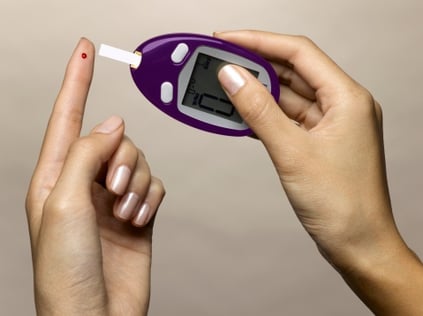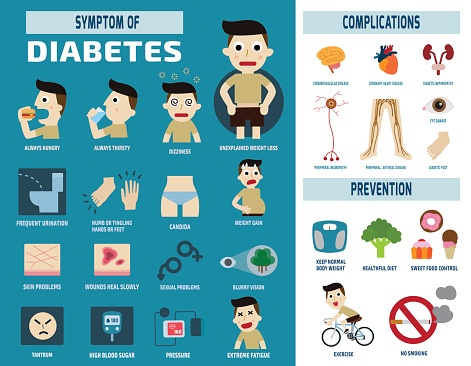 Our bodies are a complex structure with many interconnected layers and parts that allow the body to work. Our cells and organs are incredibly sophisticated in working together within the different systems of the body so that we can function the way we’re supposed to. But when one part of our body isn’t working correctly, it can have a domino effect on our body – the way we feel and our quality of life. This is true with diabetes, a common disease, that is treatable.
Our bodies are a complex structure with many interconnected layers and parts that allow the body to work. Our cells and organs are incredibly sophisticated in working together within the different systems of the body so that we can function the way we’re supposed to. But when one part of our body isn’t working correctly, it can have a domino effect on our body – the way we feel and our quality of life. This is true with diabetes, a common disease, that is treatable.
About 29.1 million Americans have diabetes – that’s about 1 out of every 11 people. Approximately 95 percent of the diagnosed cases are type 2 diabetes. Anyone at any age can develop diabetes, but it’s most common among older people. In fact, nearly 25 percent of the population 60 years and older has diabetes.
Defining Diabetes
How Diabetes Affects the Body
Diabetes is a disease that causes problems with how your body processes glucose, also called sugar. Like a car needs gas, your body needs sugar. Glucose is necessary because it’s the body’s main source of energy. When you eat foods such as carbohydrates, glucose is produced in the liver, enters the blood stream, and is stored in your cells, muscles, and other organs to fuel you and give you energy.
When you eat food, your pancreas makes and releases an essential hormone called insulin. The pancreas is an organ in your body that produces insulin as well as other hormones that break down the foods you eat and help you receive energy from those foods. Insulin works like a key, unlocking your cells and allowing glucose in, without letting the glucose build up in the blood stream. This is what happens when everything is working as it should.
However, when you have diabetes, your insulin production and function is defective. Either your body isn’t using the insulin properly or your body is unable to make any or enough insulin, causing high blood sugar levels to build up in the body. This is called hyperglycemia.
High blood sugar levels can cause negative side effects in your body such as fatigue and eye problems, and make you feel very sick. If your diabetes is not controlled through a medical treatment plan (e.g., monitoring, medication, etc.), you may be subject to more serious and long-term side effects such as heart problems, stroke, kidney failure or blindness.
Developing Diabetes
Type 1 Diabetes
Type 1 diabetes is an autoimmune disease that occurs when the immune system attacks the cells in the pancreas. These cells are called beta cells and produce the insulin needed to process glucose.
Type 1 diabetes typically develops quickly. It’s as if the body’s immune system suddenly quits and tells the pancreas’s insulin production to stop working. People with type 1 diabetes may see a rapid onset of symptoms in just a day’s time. They can go from feeling totally normal to feeling suddenly and extremely tired, warm, sweaty, and have fruity smelling breath—to name just a few symptoms. Someone with type 1 diabetes may also experience sudden, unexplained weight loss.
If someone suspects they or their child is experiencing rapid onset of type 1 diabetes, they will need immediate medical treatment. When checked, their blood sugar levels are nearly off the charts, confirming they have type 1 diabetes. In the hospital, an IV insulin will be administered to lower the blood sugar levels, and the patient will be sent home with insulin shots and a plan to control their diabetes.
Type 1 diabetes can occur at any age; however, most patients are diagnosed as children or young adults. People with type 1 diabetes must take insulin daily to replace what their body can no longer make and to manage their condition.
In the United States, only about five to 10 percent of diabetes cases are type 1. Type 1 diabetes is less common than type 2 diabetes, and the exact cause isn’t completely understood yet, although genetic or environmental factors are suspected to be part of the cause.
Type 2 Diabetes
Type 2 diabetes is the most common form of this disease. Unlike type 1 diabetes, type 2 develops gradually over time and with age. Many factors can lead to an increased risk of developing type 2 diabetes: family history, weight gain, sedentary lifestyle, and stress.
With type 2 diabetes, the pancreas still produces insulin, but the body has a resistance to it. When type 2 diabetes begins to develop, the pancreas will work overtime to produce extra insulin, but eventually it won’t be able to keep up. The body can’t handle the insulin well and stops using it effectively.
Because of this insulin resistance, glucose is no longer able to enter the body’s fat, liver, and muscle cells where it’s supposed to be stored and used later for energy. Instead, glucose builds up in the blood stream, causing many negative symptoms in the body, including fatigue and weakness, headaches, and frequent urination.
Gestational Diabetes

Gestational diabetes can occur during pregnancy, which is why women should be screened for it early in their pregnancy – it usually develops between 24 and 28 weeks. All pregnant women should be tested for gestational diabetes because oftentimes there are no visible symptoms. It should be controlled by monitoring blood sugar levels and following a meal plan and light exercise regime, like taking a walk after a meal. Some women with gestational diabetes may also need insulin.
When a woman has gestational diabetes, the pregnancy hormones cause the body to become resistant to insulin, leading to higher-than-normal blood sugar levels. If the diabetes is left undiagnosed and untreated, it can affect the baby’s weight and breathing.
Typically, once the baby is born, gestational diabetes resolves in the mother. Unfortunately, women who have gestational diabetes are at a higher risk of developing type 2 diabetes in the future. If this is the case for you, be sure to follow up with your doctor about what to do after pregnancy.
Prediabetes
Prediabetes isn’t really diabetes – yet. Prediabetes is considered to be the step before developing type 2 diabetes. People with prediabetes have higher-than-normal blood sugar levels, but not high enough to be diagnosed with diabetes. They are at a higher risk for developing type 2 diabetes and other serious conditions, including heart disease and stroke. People with certain risk factors are more likely to develop prediabetes and eventually type 2 diabetes.
Risk factors for prediabetes and type 2 diabetes include:
- Being age 45 and older
- Being overweight or obese
- Having a family history of diabetes
- Having an African American, Hispanic/Latino, American Indian, Asian American, or Pacific Islander racial or ethnic background
- Having a history of gestational diabetes
- Having given birth to a baby weighing nine pounds or more
- Being physically active less than three times a week
Talk with your doctor about testing your blood sugar levels and about how you can prevent diabetes.
Diagnosing Diabetes
Symptoms of Diabetes
Someone with diabetes may have some or none of the following symptoms. If you think you or your child might have diabetes, visit your doctor for diagnosis and treatment:
- excessive thirst
- extreme hunger
- frequent urination
- fatigue, extremely tired most of the time
- slow-healing sores or cuts
- very dry skin
- more infections than usual
- sudden vision changes, like blurry vision
- quick, unexplained weight loss (type 1 diabetes)
- Nausea, vomiting, stomach ache (type 1 diabetes)
- pain, numbness, or tingling in the hands or feet (type 2 diabetes)
- heart attack (type 2 diabetes)

Living with Diabetes
Early diagnoses and treatment of diabetes is important. The earlier you detect diabetes and treat it, the better you can decrease the risk of developing serious and long-term complications. If untreated, some of the long-term problems of diabetes can include kidney failure, nerve damage, heart problems, and vision loss.
Get screened regularly by your doctor, especially if you have a family history of diabetes or other conditions, such as polycystic ovarian syndrome and obesity, that may increase your likelihood of developing diabetes.
If you are diagnosed with diabetes, your doctor will help you develop a plan for managing it. Managing diabetes involves regularly tracking your blood glucose levels, eating healthy, exercising, and may also require taking insulin to regulate your blood sugar. You doctor will work with you to adjust your insulin to the correct level, so that your blood sugar is not too high (hyperglycemia) or too low (hypoglycemia).
Here are a few things you can do to reduce your chance of developing diabetes:
- Eat healthy and avoid skipping meals
- Understand eating carbohydrates as it relates to your diabetes
- Avoid sugary beverages
- Cut back on alcohol consumption
- Exercise regularly
- Keep excess weight down
- Stop smoking cigarettes (if you’re a smoker)
- Minimize stress in your life
If you’re concerned you or a family member may have diabetes, visit your doctor or visit the Medical Specialty Center—Your Everyday Health Care Clinic—at Orchard Hospital. We perform routine tests to obtain immediate results for you. Appointments are recommended, but walk-ins are welcome. Our experienced staff provide a full range of medical services, including blood glucose tests to aid in the diagnosis and treatment of diabetes. We will take care of you quickly and efficiently.
Orchard Hospital is a community sponsored hospital. It is a non-profit organization dedicated to serving our local communities of Biggs, Gridley, Richvale, and Live Oak. It’s our goal to have fast and friendly care while delivering accurate screening, diagnosis and education.
Our mission at Orchard Hospital is to provide our community with superior healthcare. We strive to ensure that your experience at Orchard Hospital is as pleasant and comfortable as possible. Our priority is to provide you with the care you need when you need it, with skill, compassion, and respect.



